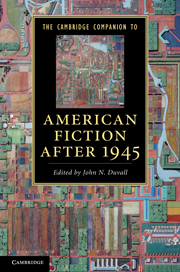Book contents
- Frontmatter
- Introduction: A story of the stories of American fiction after 1945
- PART I POETICS AND GENRES
- PART II HISTORICAL AND CULTURAL CONTEXTS
- PART III MAJOR AUTHORS
- 14 Ralph Ellison
- 15 Flannery O'Connor
- 16 Thomas Pynchon
- 17 Toni Morrison
- 18 Don DeLillo
- Conclusion: Whither American fiction?
- Index
- Cambridge Companions to …
18 - Don DeLillo
from PART III - MAJOR AUTHORS
Published online by Cambridge University Press: 28 March 2012
- Frontmatter
- Introduction: A story of the stories of American fiction after 1945
- PART I POETICS AND GENRES
- PART II HISTORICAL AND CULTURAL CONTEXTS
- PART III MAJOR AUTHORS
- 14 Ralph Ellison
- 15 Flannery O'Connor
- 16 Thomas Pynchon
- 17 Toni Morrison
- 18 Don DeLillo
- Conclusion: Whither American fiction?
- Index
- Cambridge Companions to …
Summary
In Don DeLillo's first novel, Americana (1971), David Bell abandons his role as a network television executive and takes to the road to make a film only to confront “the thick paragraphs and imposing photos, the gallop of panting adjectives” that have preceded his vision of the nation. The novel adumbrates many of the themes that inform DeLillo's later works: the often embattled relationship between words and images, the human need for systems in the seeming absence of a divine plan, the competing paradigms of contingency and conspiracy, the limits of knowledge and the desire for mystery, the responsibility of the artist to take stock of the world, and the erasure of subjectivity in an increasingly mediated century. Noting that he “had almost the same kind of relationship with [his] mirror that many of [his] contemporaries had with their analysts,” David confesses that his “whole life was a lesson in the effect of echoes, that [he] was living in the third person.”
Describing DeLillo as a “postmodern Henry Adams,” David Cowart has noted both authors' interest in “gauging ‘the track of the energy’ that makes or transforms a civilization,” but the connection between DeLillo and Adams goes further. Adams's ironic use of a third-person perspective in an autobiography certainly speaks to a crisis of identity engendered by a classical education ostensibly unsuitable for a modern world run by machines.
- Type
- Chapter
- Information
- The Cambridge Companion to American Fiction after 1945 , pp. 244 - 255Publisher: Cambridge University PressPrint publication year: 2011

